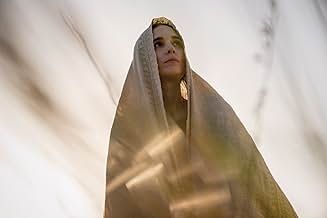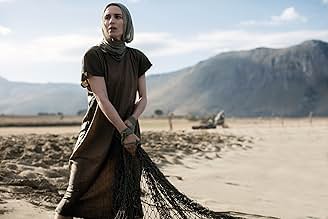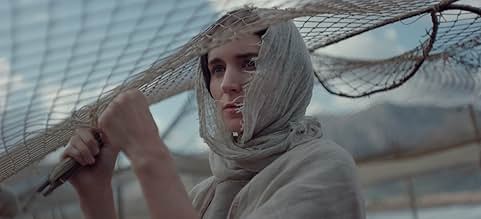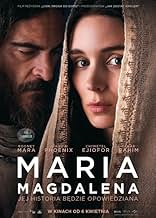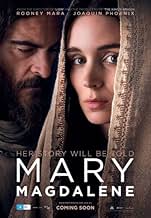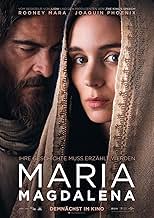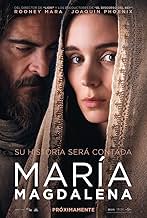- Awards
- 2 wins & 5 nominations total
- Director
- Writers
- All cast & crew
- Production, box office & more at IMDbPro
Featured reviews
The simple way of explaining this movie is imagine if Terence Malick filmed it, but he attempted to make the feel of it to be like a Tarkovskij film. I had a decent time watching "Mary Magdalene". You can look at the pictures and performances and see the beauty of the story. Yet, I hate to say it: It slows down and becomes un-eventful too many times. The director Garth Evans went the melancholic route were you are supposed to feel like you are wandering the landscapes with Jesus and his apostles. The world is a silent and lonely one, and there's barely much happiness going on. Jesus may spread wisdom, hope and kindness. Although here he keeps that sad stare as if something is troubling him. I think it was supposed to symbolize serenity, but it made him seem more depressed. Every adaptation of the Jesus story presents a different interpretation and here again, they give you a slightly sorrowful looking Joaquin Phoenix. He wasn't bad at all though. Just somewhat distracting at first because I kept thinking of his character in "Inherent Vice". As the movie progressed I got used this version. So it was alright. You can't hate Phoenix any way. He's a nice guy. Rooney Mara is wonderful as Mary. She carries a lot of this movie as its told from her perspective. I enjoyed her interaction with the rest of the apostles as well as her mutual respect and connection to what Jesus wanted to say. She struggles in the difficult world, but maintains that inner warmth that you need when you comfort someone in need.
I think the film is OK. The slow parts drag and there are only so many melancholic stares you can endure before you go: "Come on, guys. I get it". It's supposed to a realistic approach. You hear the sounds of nature and the breeze of the wind as you wander the fields with short grass. All of that is nice. But it's constantly dramatic and quiet. I wanted to see some more kindness and optimism to show us more nuances from the characters. You've seen the Jesus story be told many times and here's another one. It's not bad, but it lacked a special punch of uniqueness. I think "Last Days in the Desert" handled the quiet melancholic version of the tale better. This is not a bad attempt, but more of an underwhelming one. It's beautiful to look at and you have nice people who you follow. But it leaves you feeling more empty than you should. I respect what Mary Magdalene did and I'm happy I got to understand her perspective. But I don't think I ever have to see this entire movie again. Only recommended to loyal fans of the people involved making the film and those who are interested in the different adaptations the Jesus story.
I think the film is OK. The slow parts drag and there are only so many melancholic stares you can endure before you go: "Come on, guys. I get it". It's supposed to a realistic approach. You hear the sounds of nature and the breeze of the wind as you wander the fields with short grass. All of that is nice. But it's constantly dramatic and quiet. I wanted to see some more kindness and optimism to show us more nuances from the characters. You've seen the Jesus story be told many times and here's another one. It's not bad, but it lacked a special punch of uniqueness. I think "Last Days in the Desert" handled the quiet melancholic version of the tale better. This is not a bad attempt, but more of an underwhelming one. It's beautiful to look at and you have nice people who you follow. But it leaves you feeling more empty than you should. I respect what Mary Magdalene did and I'm happy I got to understand her perspective. But I don't think I ever have to see this entire movie again. Only recommended to loyal fans of the people involved making the film and those who are interested in the different adaptations the Jesus story.
The 6 stars are for the actors, the quality of the images and the bravery to make a movie about such a controversial subject. I am sadden for the fact that the plot has so many holes that even being a Christian (myself) didn't help. Christ journey during his last 3 years on earth was so immeasurably profound it changes lives to this day, 2000 years after. I was expecting that bringing the role of Mary Magdalene into light would make a fabulous complement. It didn't.
This movie was very well done. It was a handsome production, the cinematography was very lovely, the acting was quite good and overall I would say it was a decent depiction of a tiny little chapter of the life of Christ. I wished they had spent a little more time developing his persona, his following, the conversion of the crowds and perhaps his miracles, something to give us a better feel for the evolution of this great saint. One of the issues I have with the depictions of saints is that it's very difficult for most actors to play a sense of joy, exaltation, omniscience and to convey the kind of consciousness these Prophets and great Saints experience. That aside, it was a reasonably good portrayal of a an extremely brief period of this great man's life and the ultimate finale.
Mary Magdalene, according to the Gospels, was a follower of Jesus as one of his followers and was a witness to His crucifixion, burial, and resurrection. In Christian tradition she has frequently been described as a repentant prostitute, although there is no Biblical authority to support this theory or her identification with either the anonymous "sinful woman" who anoints Jesus's feet or with the equally anonymous "woman taken in adultery". There is also no evidence to support the theory occasionally put forward (e.g. in "The Da Vinci Code") that she and Jesus were married. Another assumption which has been made is that she was wealthy, and there is some Biblical support for this in that Luke refers to her supporting Jesus's ministry "out of her resources".
In this film, however, Mary Magdalene is a poor girl from Magdala on the Sea of Galilee. The real Magdala appears to have been a sizeable and prosperous town, but here it is depicted as a small and impoverished fishing village. She becomes a follower of Jesus, but her presence in His circle is not always welcomed by His male disciples. This is not simply a question of male chauvinism; there are also theological and ideological differences between Mary and the other disciples.
In the Gospels Judas Iscariot betrays Jesus for money, but it has become almost a cliché in New Testament biblical dramas to depict Judas as a Zealot, a freedom fighter hoping to liberate Judea from the control of the Roman Empire, an interpretation adopted in both "King of Kings" and "The Greatest Story Ever Told", even though there is no Biblical support for it. According to this interpretation Judas betrayed Jesus either in a bid to force Him to launch a Holy War against the Romans or out of disappointment that Jesus would not do so. This interpretation is followed in this film, except that here it is not just Judas who is a Zealot. All the other male disciples, especially Peter, hold similar views.
Mary Magdalene, however, is different. In a development again not found in the canonical Gospels (although it may derive some support from the non-canonical Gnostic Gospels) she is the only one who fully understands Jesus, that his is a message of peace and forgiveness, not of Holy War against the godless, and who helps to bring the male disciples (except Judas) round to this way of thinking.
There is nothing really wrong with Rooney Mara's performance in the main role, but she does not really stand out. The one outstanding performance comes from Joaquin Phoenix. Some might argue that Phoenix, aged 44 but looking considerably older behind that heavy beard, was too old to play Jesus, who died when He was only 33. Yet I think that there was probably a conscious decision on the part of the film-makers to get away from a young, handsome Jesus as portrayed by Robert Powell in "Jesus of Nazareth" or Jeffrey Hunter in "King of Kings" (aka "I Was a Teenage Jesus") and that the reasoning behind this decision was to downplay the idea that Mary's attraction to Jesus was sexual or romantic rather than spiritual. Phoenix gives us a deeply human Jesus, very different from traditional Christian ideas about the Second Person of the Trinity, co-equal and co-eternal with the Father. This is no charismatic orator or commanding religious leader but a humble carpenter's son turned itinerant preacher, a man whose appeal is grounded not in blazing rhetoric or miraculous powers but in his humility and his faith in God, a faith which remains unshaken despite moments of doubt. The film is very different to the traditional large-scale Biblical epic. It appears to have been made on a relatively small budget, lacking the elaborate sets and costumes and the large-scale set-piece scenes of something like "The Greatest Story...". It is austere in its visual style and the characters mostly wear plain homespun garments appropriate to their humble origins. It can at times be ponderous and slow-moving, yet there is a rugged simplicity and sincerity about it which means that it is able to bring Christianity to life in a way which more grandiose productions (and here I am thinking particularly of "The Greatest Story...") are not. 7/10
In this film, however, Mary Magdalene is a poor girl from Magdala on the Sea of Galilee. The real Magdala appears to have been a sizeable and prosperous town, but here it is depicted as a small and impoverished fishing village. She becomes a follower of Jesus, but her presence in His circle is not always welcomed by His male disciples. This is not simply a question of male chauvinism; there are also theological and ideological differences between Mary and the other disciples.
In the Gospels Judas Iscariot betrays Jesus for money, but it has become almost a cliché in New Testament biblical dramas to depict Judas as a Zealot, a freedom fighter hoping to liberate Judea from the control of the Roman Empire, an interpretation adopted in both "King of Kings" and "The Greatest Story Ever Told", even though there is no Biblical support for it. According to this interpretation Judas betrayed Jesus either in a bid to force Him to launch a Holy War against the Romans or out of disappointment that Jesus would not do so. This interpretation is followed in this film, except that here it is not just Judas who is a Zealot. All the other male disciples, especially Peter, hold similar views.
Mary Magdalene, however, is different. In a development again not found in the canonical Gospels (although it may derive some support from the non-canonical Gnostic Gospels) she is the only one who fully understands Jesus, that his is a message of peace and forgiveness, not of Holy War against the godless, and who helps to bring the male disciples (except Judas) round to this way of thinking.
There is nothing really wrong with Rooney Mara's performance in the main role, but she does not really stand out. The one outstanding performance comes from Joaquin Phoenix. Some might argue that Phoenix, aged 44 but looking considerably older behind that heavy beard, was too old to play Jesus, who died when He was only 33. Yet I think that there was probably a conscious decision on the part of the film-makers to get away from a young, handsome Jesus as portrayed by Robert Powell in "Jesus of Nazareth" or Jeffrey Hunter in "King of Kings" (aka "I Was a Teenage Jesus") and that the reasoning behind this decision was to downplay the idea that Mary's attraction to Jesus was sexual or romantic rather than spiritual. Phoenix gives us a deeply human Jesus, very different from traditional Christian ideas about the Second Person of the Trinity, co-equal and co-eternal with the Father. This is no charismatic orator or commanding religious leader but a humble carpenter's son turned itinerant preacher, a man whose appeal is grounded not in blazing rhetoric or miraculous powers but in his humility and his faith in God, a faith which remains unshaken despite moments of doubt. The film is very different to the traditional large-scale Biblical epic. It appears to have been made on a relatively small budget, lacking the elaborate sets and costumes and the large-scale set-piece scenes of something like "The Greatest Story...". It is austere in its visual style and the characters mostly wear plain homespun garments appropriate to their humble origins. It can at times be ponderous and slow-moving, yet there is a rugged simplicity and sincerity about it which means that it is able to bring Christianity to life in a way which more grandiose productions (and here I am thinking particularly of "The Greatest Story...") are not. 7/10
Mary Magdalene is story of the woman who is known in many Christian traditions as the "apostle to the apostles". Mary is a central figure in later apocryphal Gnostic Christian writings, which portray her as Jesus's closest disciple and the only one who truly understood his teachings. In this film, Mary Magdalene's closeness to Jesus results in tension with the other disciples, particularly Peter, as the film highlights the fact that women in Judaean society were considered inferior to men.
It's a 2 millennium old story for our times and director Garth Davis casts a perfect Rooney Mara as the intelligent, independent thinking Mary, who is drawn away from a life of midwifery and arranged marriage in her small fishing village, to following and seeking inspiration from the quietly charismatic Jesus, played convincingly by Joaquin Phoenix.
The Italian locations dutifully and realistically stand in for the countryside around the Sea of Galilee and Jerusalem and the film is produced with obvious reverence for its subjects.It succeeds in conveying the collective Jewish belief and yearning for the coming of a Messiah, a powerful political leader who would unite the tribes of Israel into standing up against the yolk of Roman oppression.
Unfortunately the pacing of this film, which is not overfilled with dialogue at the best of times, is frequently glacial in nature. There are countless silent pauses where various characters gaze soulfully, sometimes mournfully, into each others' eyes. Mary is an entrancing character, but her story, both biblically and as played out in this movie, is just frustratingly sparse. We want to be given more details about her life story, but it just doesn't occur and it is pretty clear that both female script writers were never intent on veering away from their various Gospel sources of reference. As such, momentum falters alarmingly, especially during the second act, where Mary is sidelined as a bit player to Jesus's wandering mission. We end up being left with a long, but ironically too lean and somewhat bland story of the woman who is becoming more recognised as the 'First of the Apostles". I think she deserved a story more inspiring and energetic than Mary Magdalene ends up being.
It's a 2 millennium old story for our times and director Garth Davis casts a perfect Rooney Mara as the intelligent, independent thinking Mary, who is drawn away from a life of midwifery and arranged marriage in her small fishing village, to following and seeking inspiration from the quietly charismatic Jesus, played convincingly by Joaquin Phoenix.
The Italian locations dutifully and realistically stand in for the countryside around the Sea of Galilee and Jerusalem and the film is produced with obvious reverence for its subjects.It succeeds in conveying the collective Jewish belief and yearning for the coming of a Messiah, a powerful political leader who would unite the tribes of Israel into standing up against the yolk of Roman oppression.
Unfortunately the pacing of this film, which is not overfilled with dialogue at the best of times, is frequently glacial in nature. There are countless silent pauses where various characters gaze soulfully, sometimes mournfully, into each others' eyes. Mary is an entrancing character, but her story, both biblically and as played out in this movie, is just frustratingly sparse. We want to be given more details about her life story, but it just doesn't occur and it is pretty clear that both female script writers were never intent on veering away from their various Gospel sources of reference. As such, momentum falters alarmingly, especially during the second act, where Mary is sidelined as a bit player to Jesus's wandering mission. We end up being left with a long, but ironically too lean and somewhat bland story of the woman who is becoming more recognised as the 'First of the Apostles". I think she deserved a story more inspiring and energetic than Mary Magdalene ends up being.
Did you know
- TriviaRooney Mara and Joaquin Phoenix started dating during the production of this film.
- GoofsWhen Mary Magdalen leaves the lake after being baptized, her wet dress is slightly opaque and clinging. The straps to her bra or bikini top are noticeable.
- Quotes
[first lines]
Mary Magdalene: And she asked him, "What will it be like? The kingdom?" And he said, "It is like a seed, a single grain of mustard seed, which a woman took and sowed in her garden. And it grew and it grew. And the birds of the air made nests in its branches."
- ConnectionsFeatured in Projector: Mary Magdalene (2018)
- SoundtracksPsalm 121
Traditional, arranged by Sophia Brous
Performed by Tchéky Karyo
- How long is Mary Magdalene?Powered by Alexa
Details
- Release date
- Countries of origin
- Official sites
- Languages
- Also known as
- María Magdalena
- Filming locations
- Production companies
- See more company credits at IMDbPro
Box office
- Gross US & Canada
- $124,741
- Opening weekend US & Canada
- $46,646
- Apr 14, 2019
- Gross worldwide
- $11,710,110
- Runtime2 hours
- Color
- Aspect ratio
- 2.20 : 1
Contribute to this page
Suggest an edit or add missing content








